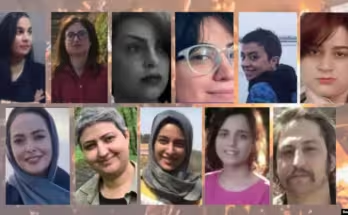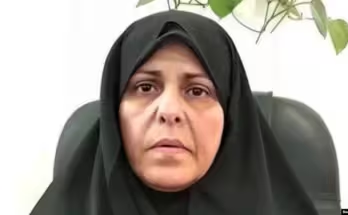By AIW Staff
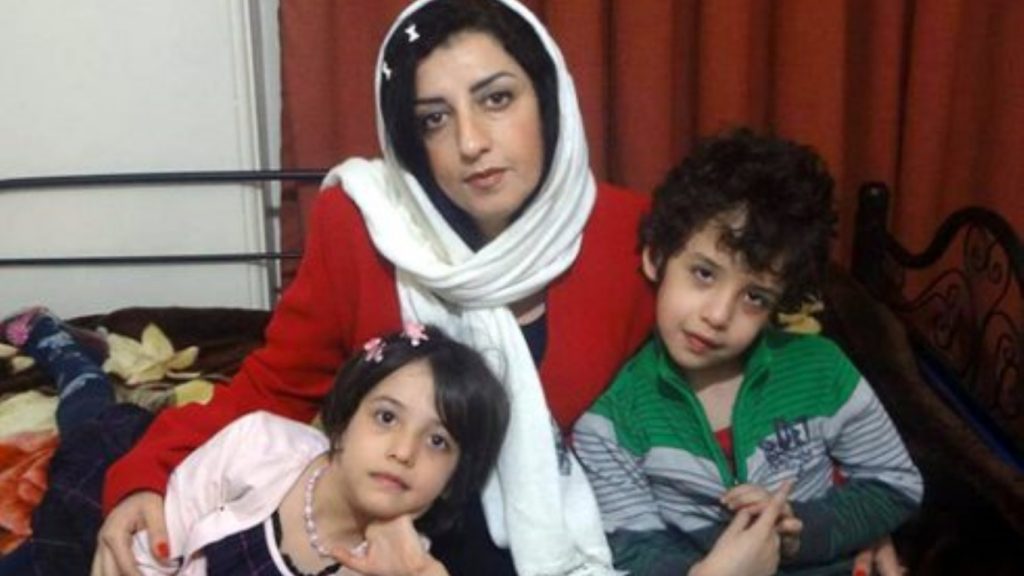
Narges Mohammadi, one of Iran’s most well-known political prisoners, fears she may soon be killed. After surviving a brutal assault in Tehran’s notorious Evin Prison on December 24th, Mohammadi has been transferred to an isolated and dilapidated prison in Zanjan, over 200 miles away from Tehran. Mohammadi had previously been threatened with being sent to that Zanjan prison in order to die.
The 47-years-old, Narges Mohammadi has been imprisoned several times before. Her current 16-year prison term began in 2016, when she was convicted of having established an “illegal group” called Legam, which, in Persian, is an acronym for “Abolish the Death Penalty.” On December 21st, Mohammadi and seven other female prisoners held in Evin had begun a hunger strike to protest the Khomeinist regime’s slaughter of 1,500 protestors in November.
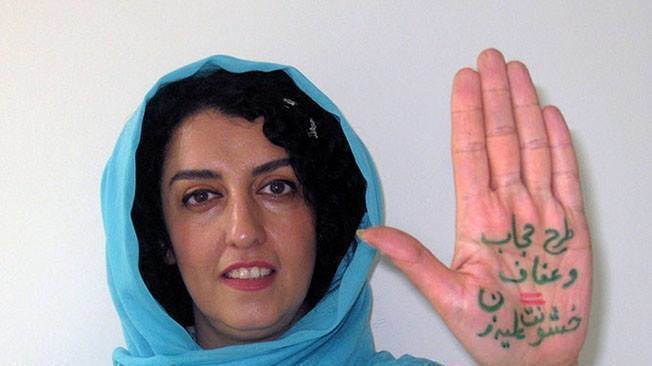
To punish her for her behind-bars activism, Evin Prison’s warden, Gholam-Reza Ziaei, summoned Mohammadi to his office on the 24th, using the pretext that her attorney was waiting there to meet her. When Mohammadi arrived at the office, however, as she described later in a letter she was able to have smuggled out of Iran, she was told she was being immediately transferred.
“On December 24, I was shown a letter that my lawyer was in the prison to meet me. As it turned out, it was a lie and there was no lawyer there. They took me to the prison governor’s room, where he, in presence of the agents from the Ministry of Intelligence, started shouting obscenities. I left the room and heard them running after me. He took my arms and wrenched them violently in order to stop me, and then they dragged me in the corridor. While I was resisting, they bashed my hand to the door, and the smashed glass panel of the door cut my hands. My hands bleeding and wrenched, they threw me into an ambulance and started driving. But they stopped in front of ward 209. The prison governor said that he would not let me return to my ward and that he was sending me to the prison in Zanjan. I began chanting a song about Iran and they attacked, beat me and pushed me into a car to take me away. My hands were still bleeding, as the medicine I take for my medical condition does not let the blood clot, and the intelligence agents pressed the handcuffs hard on my wounds. The blood dripped on my clothes until we reached Zanjan.”
Ziaei, who has been Evin’s warden since July, 2019, has a reputation for extreme cruelty. As warden of Rajai Shahr Prison in Karaj, prior to taken his current position, Ziaei was reported to have tortured political prisoners arrested during the December 2017-January 2018 wave of protests. As a result, the US Treasury Department added his name to the list of regime officials sanctioned by the US government on January 12th, 2018.
Over the past few months, Ziaie had threatened Mohammadi several times, warning her that if she did not cease her political activism, as she recalled, he would “transfer you to Zanjan prison so you get isolated, rotten and ruined in that corner.” Mohammadi also said that “the prison director made threats against me and told me, ‘You think you can do or say whatever you want? I’ll show you!’ Then I realized that in order to silence my voice, the regime would not hesitate from any act of violence or long-term imprisonment, or banning contact with my children and beating, insulting and exiling me.”
Mohammadi’s husband, Taghi Rahmani, who has lived in France since 2012 and raises their two twin children by himself, stated in a recent interview that “prisoners’ rights have been violated ever since Ziaei took the helm at Evin Prison. Narges has not been allowed to make phone calls to our children since August. After writing an open letter with Nazanin Zaghari-Ratcliffe about conditions in the prison, the Intelligence Ministry threatened to send her to another prison and now they have acted on it.”
Now that she is in Zanjan prison, Rahmani, who believes his wife might die soon, writes:
“That’s the same prison (Zanjan) where she had been held for a period of time and became seriously sick.… the Intelligence Ministry wants to punish her for supposedly protesting They know that moving her to this prison is intended to kill or paralyze a human rights activist. They have exiled her on purpose.”
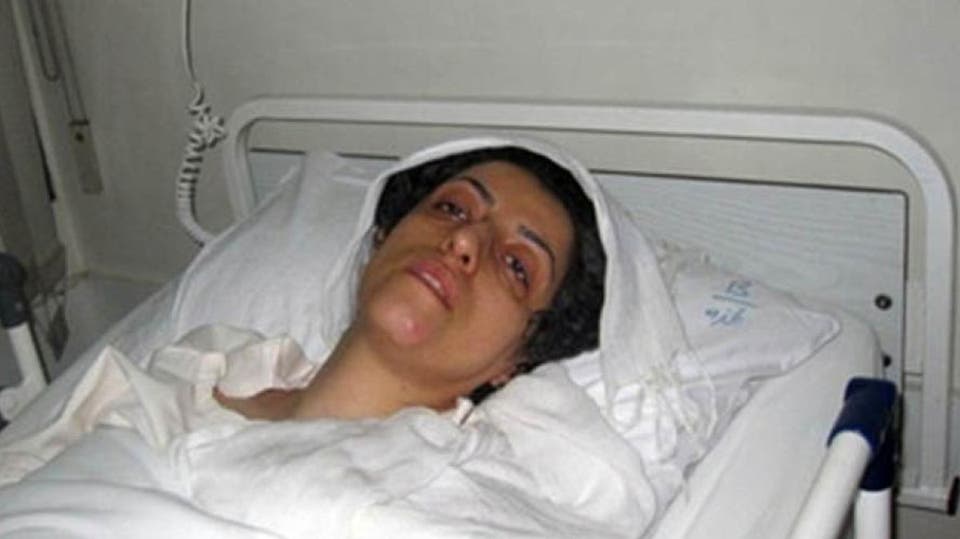
Mohammadi has had several health crises during her imprisonment, health crises that were worsened by her jailors denying her medical care. In April of last year, after falling seriously ill, Mohammadi was taken to a hospital where doctors, after examining her, concluded she needed an emergency hysterectomy. The prison guards, however, returned her to her cell and would not allow her to have the operation. A month later, in May, she was finally allowed to have the hysterectomy, but despite doctors’ warnings that Mohammadi needed to recuperate in hospital for at least a month to avoid infections, she was returned to prison after only one week. Soon afterwards, she indeed developed a severe infection, but was denied the necessary antibiotics.
A physicist by education, Narges Mohammadi won the American Physical Society’s Andrei Sakharov Prize in 2018. The prize was awarded “for her unwavering efforts to promote the human rights and freedoms of the Iranian people, despite persecution.” Mohammadi has won multiple other awards over the course of her two-decade long career as a human rights activist, including the Swedish government’s Per Anger prize in 2011, and the Alexander Langer award in 2009. In October of last year, she signed a statement with 16 other women political prisoners calling the Khomeinist regime “a misogynist system.”
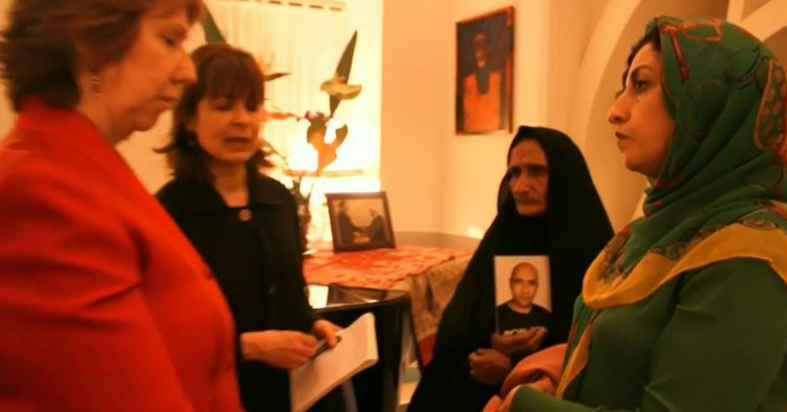
Prior to her most recent charges, Mohammadi had suffered reprisals from the regime after having met, and discussed women’s rights, with then-European Union foreign affairs minister Catherine Ashton, on March 8th (International Women’s Day) 2014. As a result of that meeting, Mohammadi’s passport was revoked, and she was deprived of the right to travel abroad. The meeting with Ashton was later cited as evidence of Mohammadi’s “crimes” in the case for which she is currently incarcerated. Despite this, Lady Ashton has never spoken out about what the Khomeinist regime has done to Nargess Mohammadi, neither regarding their meeting, nor in general.


